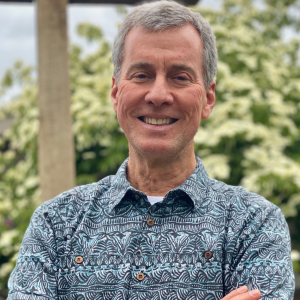Rev. Michael White recently joined the Covenant denominational team as the new vice president of mission priorities. In this capacity, he supports the executive ministers of Serve Clergy, Serve Locally, and Serve Globally, ensuring that ministry initiatives align with denominational goals and serve the Covenant as a whole. He sat down with The Companion to discuss how his ministry background informs the role, and why it’s so important. This interview has been edited for length and clarity.
How did you get connected to the Covenant?

Through my wife, Megan, who is a lifelong Covenanter. We met in seminary, and I was looking for a denominational change. Every time she talked about the Covenant or shared her history, I thought, “Oh, that sounds like the type of people, the type of movement, that I want to be a part of.”
I grew up in a charismatic community church, which I loved. I then attended an Assemblies of God school. While I appreciated my college experience, I knew God was calling me in a different direction. I even explored the Episcopal priesthood because I loved relying on the Spirit and its movement, but I longed for form and structure. I wanted something that went back hundreds of years, allowing me to pray with the Spirit while also benefiting from historical prayers. When Megan introduced me to the Covenant Church, it offered that Lutheran heritage structure, combined with a dependence on the Holy Spirit. It had form and structure, movement, and a forward-looking perspective, which I found super, super exciting.
Given your background as a pastor, why this role?
Holding the title of vice president was a surprise to me, but I view it as a structural designation for another aspect of pastoral ministry. My background has prepared me for this. I began in ministry as an associate pastor, specifically in music and worship, which gave me insight into staff dynamics and working with lead pastors.
I was also the final pastor of Fremont Covenant Church, which was a church plant. I can remember standing in my office watching cars go by the street, praying that they would come into our church. We were there for two years, and we saw growth and God’s blessing, but we didn’t quite meet the metrics and the conference closed the church.
So I know what it’s like when ministry doesn’t go as planned. I know the feeling of having no job in ministry and trusting God in uncertain times. I’ve also served as a lead pastor in multiple-staff churches across various conferences, including the Pacific Southwest, Great Lakes, and Pacific Northwest, which means I’ve learned to understand different parts of the country.
In my previous roles as lead pastor, I saw my job as getting obstacles out of the way for my staff so they could fulfill their calling. They didn’t need me to do adult ministries or pastoral care; they needed me to help them do their jobs, which involved removing obstacles, vision casting, and team building. These are the same gifts and talents I leverage in my current role.
My primary responsibility is to support the executive ministers—Serve Clergy, Serve Locally, and Serve Globally—to ensure that all ministry initiatives align with the denomination’s overarching goals and benefit the Covenant as a whole. We are still in the process of restructuring, and my job is to help these incredibly gifted executive ministers operate as a cohesive team, pulling in the same direction. If you have separate categories and everybody’s just doing their own thing, then you miss a lot of opportunity for collaboration.
What are your initial priorities in this work?
I’ve only been in this role for only a few weeks, so my initial focus is on meeting as many people as possible. I’m regularly connecting with each of the executive ministers and their teams. We have a retreat planned for October to begin team building. A significant part of my job is supporting President Tammy Swanson-Draheim’s vision for the denomination to provide services to the conferences and local churches as that’s where the actual ministry happens.
To achieve this, I need strong relationships with the conference superintendents. I’m asking crucial questions, like: What do I need to know? What would you want to know if you were in my position? How can I help you? In what ways can the denomination serve you and your churches better? What are we doing well, and what are the obstacles? What do you hope to see?
This helps me connect with my colleagues on the vice presidential team and align with Tammy’s vision.
In five years what impact do you hope to have on local Covenant churches and their members?
My hope is that I will have been a great ambassador, leading people deeper into discipleship in the way the Covenant Church understands it. I believe many people are drawn to our churches because they love the ethos of the Covenant, even if they don’t explicitly identify as “Covenanters.” They appreciate what we emphasize, and I want people to understand that this is intentional—their local church didn’t stumble upon it accidentally. I aim to educate more people on what it means to be a Covenanter because I strongly believe in our values and God’s leading.
I hope that we will be able to effectively partner with the conferences to assist them as they resource local churches. Local churches are on the front lines where people are being discipled and coming to Christ. The greatest thing anyone could say to me in five years is that I’ve helped equip them well to do the work God has called them to do. This means the denominational offices will be responsive, actively helping local church and conference ministries in their needs. We may not be creating all the content, but we can curate resources and build relationships to funnel support where it’s most needed.
Earlier you talked about leaders pulling together and not being buried in their separate ministries. Why is avoiding ministry silos so important?
Silos can lead to missed opportunities. For example, if a youth ministry is planning summer camps or service projects and they don’t coordinate with other teams, they might find the missions team planning to use the same building or hosting a competing fundraising event. In many churches different ministries might inadvertently schedule garage sales or fundraising dinners on the same weekend. Coordination ensures that everyone understands what’s happening and prevents duplication of efforts.
Furthermore, avoiding silos allows for better leveraging of individual giftedness. Imagine a youth pastor discovering that many parents of students in their ministry are struggling with addiction. While the youth pastor might consider a book study, addiction ministry might be a stronger gift of the pastoral care person or adult ministry leader. Passing people to those with stronger gifts in specific areas leads to more effective ministry, as people are working where they are most skilled. This way, the most effective ministry is placed in the most effective slot, and we avoid spinning our wheels trying to figure out who does what.
What is one thing you want people to know about you personally?
I hope people realize that I’m just a regular guy. I’m not “super spiritual” or a saint, but I love Jesus, and I want my life to be characterized by obedience to the call he has on my life. That’s why I’m in this job.
I had no desire to leave my former ministry; it was a joyful place. The ministry ran like a machine, and it was effective. However, when we felt the call of God to do this, we decided to follow where Jesus leads. If at the end of this road, people see that I have walked obediently to God’s call and hopefully modeled that, showing that God is good, provides, and can be trusted, that would be my hope.
Do you have a word for Covenanters as we move forward?
My message is this: Don’t give up. These are difficult times, but God is still on the throne. The message of the gospel is still setting people free, and it is a unifying factor. We have a unique opportunity to be known by the way we love each other and how we love other people. In this crazy time, if we can truly live into that, I believe that is how God will draw people to himself—through our love for Jesus and each other.














